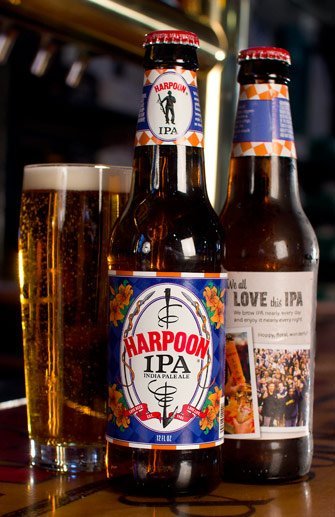
Throughout New England, the beer is known by most beer drinkers simply as IPA. But the IPA, having emerged as the most popular style in craft beer, according to IRI, has also become somewhat synonymous with extreme, hoppy, and bitter taste — what’s often called a “West Coast Style IPA.”
And with an avalanche of new craft offerings flooding the market, brewery co-founder Rich Doyle decided it was time for a definition.
So, in an attempt to help call attention to their own IPA offering, Harpoon said it will begin marketing the brand as a “New England-style IPA.”
“Twenty years later, the forest has grown up around us,” Doyle said “It’s a really important now to start allowing people to know why one IPA might be different than another.”
While many consumers may share a voracious appetite for palate-numbing brews, others will continue to seek a more balanced offering, like Harpoon’s, Doyle said.
“We just thought we could add to the discussion and help consumers navigate between IPAs,” said Doyle.
Harpoon plans to deploy the new definition across its website, social media messages, press releases and will even begin printing the phrase on some of its point-of-sale materials.
During a live webcast with co-founder Daniel Kenary, Doyle explained what differentiates that “New England-style IPA” from its West Coast counterpart. Doyle described a New England-style IPA as a harmonious balance of ingredients, characterized by no single flavor prevailing above the rest. That, he says, is a departure from many of the more hop-forward offerings dominating today’s tap handles.
“People might prefer one or the other,” Doyle said.
But while Harpoon wants to help define the customer expectation, Doyle believes it’s also important to distinguish that the style is region specific in name only. For instance, Harpoon’s Rich & Dan’s Rye IPA might fall under the “West Coast-style” umbrella, while competitor beers originating from the West Coast could fit the “New England-style” criteria Doyle has laid out. He believes it’s about representing where you came from.
“The name we chose for the company is evocative of the history,” he said. “Clearly we’ve aligned ourselves as a New England company.”
But will it stick?
“Once the term gets more well known, I think people will absolutely use it,” said Doyle. “Change happens slowly, but once it’s there, people are going to be like ‘oh, okay, that makes sense.’”